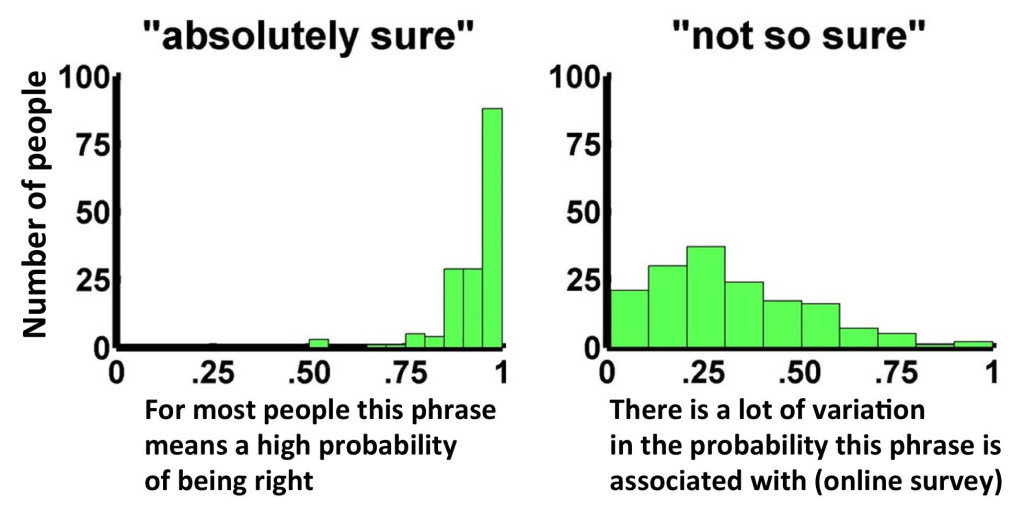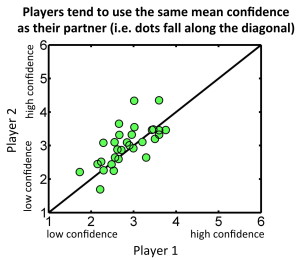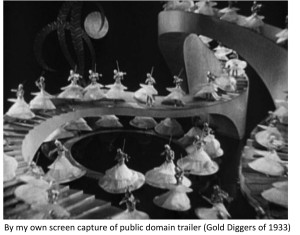Our Danish friend, Dan Bang , is just finishing his DPhil on Confidence.
If you type confidence into Google you will get millions of hits, mostly about self-confidence. You are told that, for a small fee, self-confidence can be learned and will enable you to influence people and earn more money.
This is not the kind of confidence that Dan is interested in.
I associate confidence with psychophysics experiments. You make people look at an endless series of pictures in which there may or may not be moving dots. You ask them, ‘Were the dots moving?’ and then ‘How confident are you that they were moving?’ These experiments are so boring that the only people prepared to take part are the authors of the paper.
CDF: So why is confidence so interesting?
DB: On the one hand, confidence is an objective quantity. We can link confidence to behaviour or real-world events. We can ask, when people are more confident, are they also more likely to give the correct answer? We call this resolution (or metacognitive sensitivity). The more people’s low and high confidence discriminates between their incorrect and correct answers, the higher the resolution.
On the other hand, confidence is also a subjective quantity. You and I might have different ideas about what it means to be “not so sure” – does it mean that the probability that we are correct is 25% or 50%? We call this calibration (or metacognitive bias). So even if our confidence has the same resolution, I might express myself more cautiously than you do. Our low and high confidence need not fall within the same range. I might say “not so sure” when thinking that there is a 75% probability that I am correct. But you might have no problem saying “absolutely certain”.
 For me, confidence is interesting because, with carefully controlled experiments, we can quantify how people communicate their inner states, and we can ask whether the way in which they communicate this information changes with the social context.
For me, confidence is interesting because, with carefully controlled experiments, we can quantify how people communicate their inner states, and we can ask whether the way in which they communicate this information changes with the social context.
CDF: So it may be interesting for you, but aren’t the experiments still boring?
DB: People don’t get bored doing my experiments. They work together in pairs and discuss what they have seen. We often think that confidence is a private experience, but in my experiments people talk to each other about how confident they feel.
CDF: Why would they talk about their confidence?
DB: If they disagree about what they have seen, they have to decide who is right. A good rule of thumb is that the more confident person is also more likely to be right. Two people working together can do better than the best person working alone, and the more they talk about confidence the greater the advantage for the pair. Simply by going with the more confident person after each presentation you can get an advantage.
CDF: How can people predict whether they are going to be right or not? This is very mysterious to me. Where does the information come from?
DB: There are a lot of different theories. Some think that our confidence directly reflects the reliability or strength of the information upon which our decisions are based. In my tasks, this information could be sampled from memory or through the senses. In general, the more reliable this information is, the more likely we are to be correct. Others don’t think we have such direct, privileged access to our inner workings. Instead, we infer our confidence.
One way to do this is to monitor the speed with which we reach our decisions. In most situations, decisions that we make quickly are more likely to be right, and fast responses tend to be associated with greater confidence. Observers are quite good at judging other people’s confidence by watching their movements. However, in one of our studies, we showed that simply going with the faster person is not as good as going with the more confident one. So, confidence seems to carry a lot of useful information.
CDF: I guess you mean that confidence is a marker of competence and speed is another marker. We would certainly want to take advice from competent people. But can’t this easily go wrong? Over-confident people think they are giving good advice when they are not. Working with an over-confident person could be disastrous.
DB: Even an over-confident person will be more confident when s/he is right and less confident when s/he is wrong. S/he can be accurate about their confidence (resolution), but have a bias to exaggerate it (calibration). If we want to work successfully with each other we need to calibrate the way we report our confidence to one another. When I say that I am very confident it has to mean the same as when you say you’re very confident.
CDF: You mean that I have to make sure that my subjective experience of confidence corresponds to your subjective experience of confidence. How is this possible? It’s like asking whether my experience of red is the same as your experience of red.
 DB: Actually there’s a quick and dirty way of doing it, so to say, which works most of the time. People usually use words, but you can ask them to use numbers from 1 to 6 to indicate their confidence. An under-confident person might mostly use the numbers 1 to 4, while an over-confident person mostly uses the numbers 4 to 6. It ‘s fairly obvious that they are using the scale in a different way. I have found that people align their use of such confidence scales so that they have the same average confidence rating across the experiment. This might not necessarily be the middle of the scale. So, some people might both use the scale in an “under-confident” way, while others might both use it in an “over-confident” way. There are very few mismatches.
DB: Actually there’s a quick and dirty way of doing it, so to say, which works most of the time. People usually use words, but you can ask them to use numbers from 1 to 6 to indicate their confidence. An under-confident person might mostly use the numbers 1 to 4, while an over-confident person mostly uses the numbers 4 to 6. It ‘s fairly obvious that they are using the scale in a different way. I have found that people align their use of such confidence scales so that they have the same average confidence rating across the experiment. This might not necessarily be the middle of the scale. So, some people might both use the scale in an “under-confident” way, while others might both use it in an “over-confident” way. There are very few mismatches.
Confidence is a subjective experience, but there are still common features that people can agree on. The two ends of the scale might be fixed at guessing and certain. It is obviously more difficult to have agreement about the middle of the scale, but people can still agree on the order of their levels of confidence.
CDF: That’s very interesting. If you used a 3-point scale of confidence, it would be difficult to be sure if we both meant the same thing with a rating of 2, but the more items in the scale the less the problem will be. In an earlier study, your colleagues showed how each pair developed their own verbal descriptions of confidence – sure, almost sure, a little sure, not quite sure, &c. I was very surprised that the mean number of levels for these spontaneously developed scales was about 18. I was surprised because we all learned, as students, that the optimum number for a scale was 7±2. But, of course, the more levels we have, the less the problem of equating subjective experience.
DB: Yes, we actually find that, if you give people a continuous scale (e.g., 1 to 6 in steps of .000001) instead of a discrete one (e.g., 1 to 6 in steps of 1), then they perform better. The problem of agreeing on what exactly each level means disappears.
 CDF: I am very interested in alignment. It seems to be a critical feature of joint action. The Mirror Neuron story is all about alignment. We automatically align our motor movements and our perception of the world. What you are telling me about confidence seems to be an example of automatic, subjective alignment.
CDF: I am very interested in alignment. It seems to be a critical feature of joint action. The Mirror Neuron story is all about alignment. We automatically align our motor movements and our perception of the world. What you are telling me about confidence seems to be an example of automatic, subjective alignment.
DB: That’s much too speculative for me.
CDF: You called this strategy a quick and dirty method. Does this mean it sometimes goes wrong?
DB: Yes, the strategy only works when the people in the group have equal competence. If they have different levels of competence, they should not try to match their confidence. The more competent person should be consistently more confident than the less competent. Otherwise the pair will take the advice of the less competent person too often.
CDF: But presumably we can notice when someone is more or less competent? Could we do this first and then adjust the way we talk about our confidence?
DB: Actually this seems to be more difficult than you might think. We just published a study showing that people take too much advice from an incompetent partner (and take too little advice from a competent partner). This is not a problem of not being able to work out that the partner is less competent (or more competent). It happened even when they had explicit feedback about their relative competence. People seem to forget this information in the situation.
CDF: But you were using Danish students and every one knows how modest and trusting they are.
DB: That can’t be the explanation. We observed just the same behaviour in Iran where people are supposed to be less trusting of each other.
CDF: I wonder why there should be this universal equality bias, when it reduces successful group decisions?
DB: Perhaps people are more interested in smooth social interactions than in accurate decisions?
CDF: That’s too speculative for me.
